Some posts on this site contain affiliate links, meaning if you book or buy something through one of these links, I may earn a small commission (at no additional cost to you!). Read the full disclosure policy here.
When is the best time to visit Shenandoah National Park?
Shenandoah National Park is one of a kind. This smaller national park is easy to access, has stunning mountain views, and even has ample opportunities to spot wildlife. If you want to spend a weekend in Shenandoah, it makes sense that you’ll want to go at the perfect time.
So when is the best time to go to Shenandoah National Park? Truthfully, any time of year is a great time to go to Shenandoah, but there are good things and bad things about visiting in each season.
Therefore, to help you decide the best time to visit Shenandoah for you, we’ve made this guide based on what you want to see, and how much you would prefer to avoid crowds.
So whether you are hoping to see dazzling wildflowers, have great weather, or have a waterfall or mountain top view all to yourself, this is the best guide on when to visit Shenandoah National Park.

Table of Contents
The Best Time to Visit Shenandoah National Park
To keep it simple, we’re breaking this guide down in seasons including pros and cons of visiting in each season, weather conditions, and how crowded it is.
Shenandoah National Park Best Time to Visit: Spring
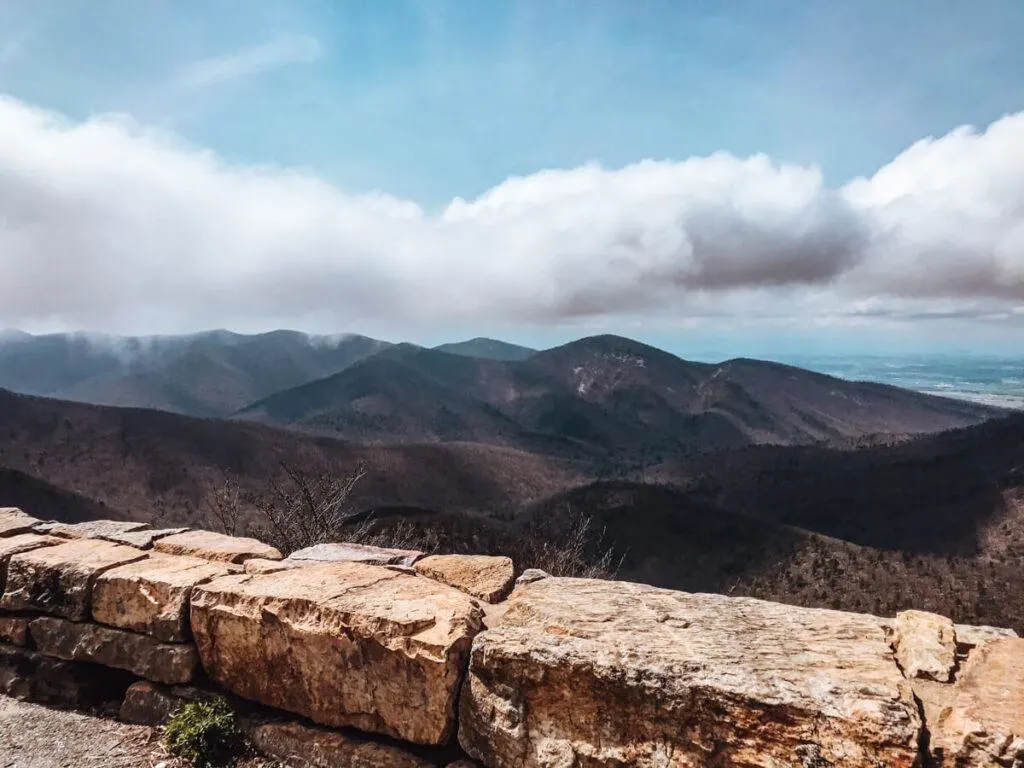
Spring is a lovely time to visit Shenandoah National Park. With trees and vibrant wildflowers beginning to bloom and blossom, fewer visitors than summer through fall, and temperatures warming up from winter, this is a wonderful time of year to visit.
This is also a great time of year to visit to be able to drive Skyline Drive without a lot of traffic, especially in the early spring! If you’re lucky, you may even get some overlooks all to yourself! Parking is also more readily available along some trails. Again, late spring may be a different story, especially on weekends.
However, this place isn’t free from crowds. When we visited in April there were still quite a lot of people out hiking, especially on more popular trails like Stony Man and Dark Hollow Falls. The parking lot was almost completely full for Dark Hollow Falls in the middle of the day on a Saturday.
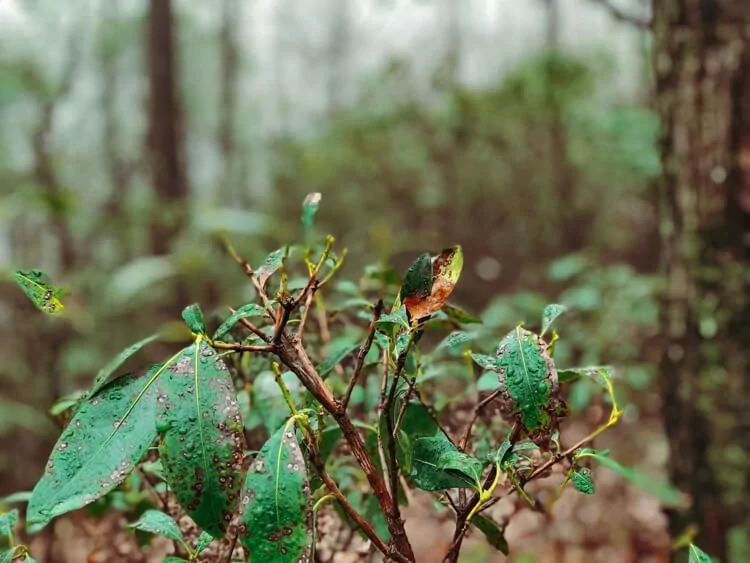
As a bonus, the roads are almost all open at this time of year as winter weather conditions have subsided. Be sure to check ahead of time, though, as this may not be the case in early spring. Also, be prepared for more fog and rain during this time of year.
Weather in Shenandoah National Park in the Spring:
There is a bit more rain here during the spring months, making everything super green! So be prepared for that! Here is the weather broken down by month:
- March: The average highs in March are around 53ºF (12ºC) and lows are closer to 33ºF (1ºC). There are about 8 days of precipitation during this time.
- April: The average highs in April are around 65ºF (18ºC) and lows are closer to 42ºF (6ºC). April also has around 8 days of precipitation.
- May: The average highs in May are around 74ºF (23ºC) and lows are closer to 52ºF (11ºC). May is the wettest month of the year with around 10 days of precipitation.
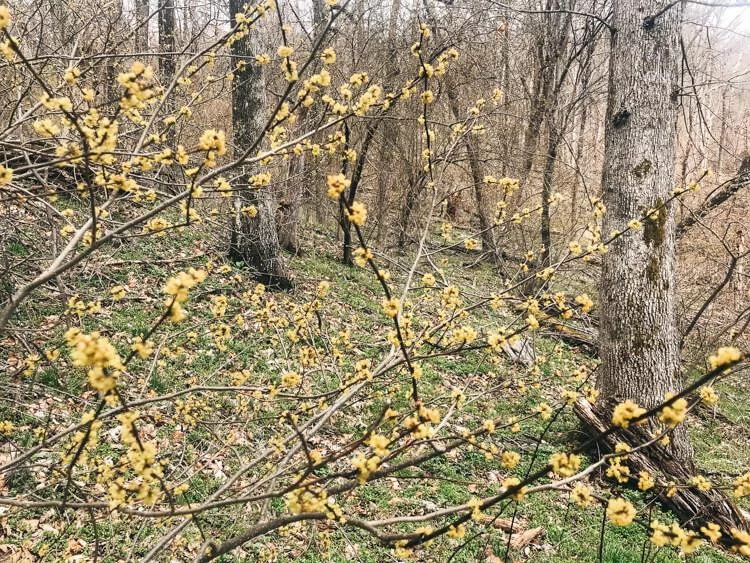
Crowds:
There are fewer crowds in Shenandoah than in the summer and fall months of the year, but this place is by no means empty. However, even on the weekends there are some hiking trails and perhaps some overlooks where you won’t see a lot of people. Again, earlier spring is far better.
Spring break is a time to avoid as you’ll have a lot of families visiting the area too. Mid-week and away from holidays will definitely increase your chances of having places with fewer crowds.
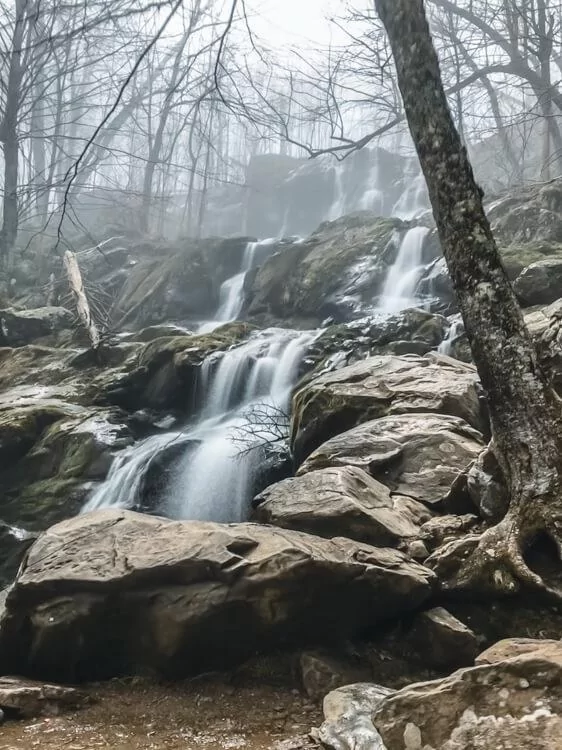
Pros of visiting Shenandoah in Spring:
- Fewer Crowds than summer and fall in the early spring! Not just during 2021 is this a good thing, but also you won’t have to worry about finding parking in most places, waiting in line on rock scrambles, and you’ll have more views to yourself!
- Baby animals. There are baby animals and wildlife, in general, starting to frolic around the park after a long winter. You can potentially spot black bears, white-tailed deer, and several birds while exploring the park. Just be careful and keep a safe distance!
- Temperatures are better than in the heat of summer.
- Fewer bugs. You’ll still have to watch out for ticks, but there are far fewer bugs in the spring.
- More rain does mean more exciting waterfalls!
- Better hotel deals in the area because this isn’t peak season.
- Wildflowers are starting to bloom.
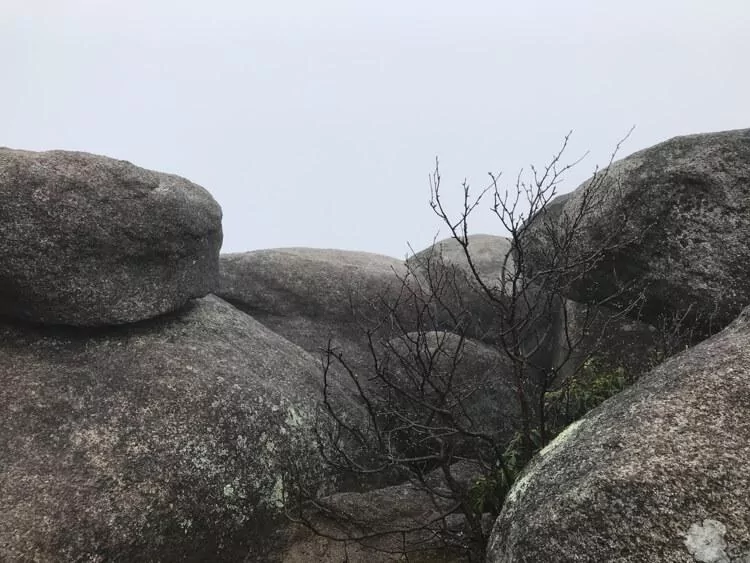
Cons of visiting Shenandoah National Park in the spring:
- May is the rainiest month of the year, so be prepared with a rain jacket and many layers while hiking.
- Because of the rain, there can be quite a bit of fog, making driving Skyline Drive a challenge and hard to see those mountain views.
- Some roads and trails could be closed in early spring if weather conditions are bad.
- Lodging is closed in early spring.
- Later spring will bring in a lot more crowds so plan accordingly.
Overall, spring is a really good time to visit to avoid the crowds in the early spring that gather in the summer and autumn months. It can rain a bit during this time of year, but it isn’t all the time.
We visited in April and, while it was rainy and foggy for a while, we were still able to go on some incredible hikes and see some great views later in the day.
However, the weekend prior (and the day we left because of course!) it was completely sunny and warm! This time of year is definitely the best time to visit Skyline Drive with less traffic!
When to Visit Shenandoah National Park: Summer
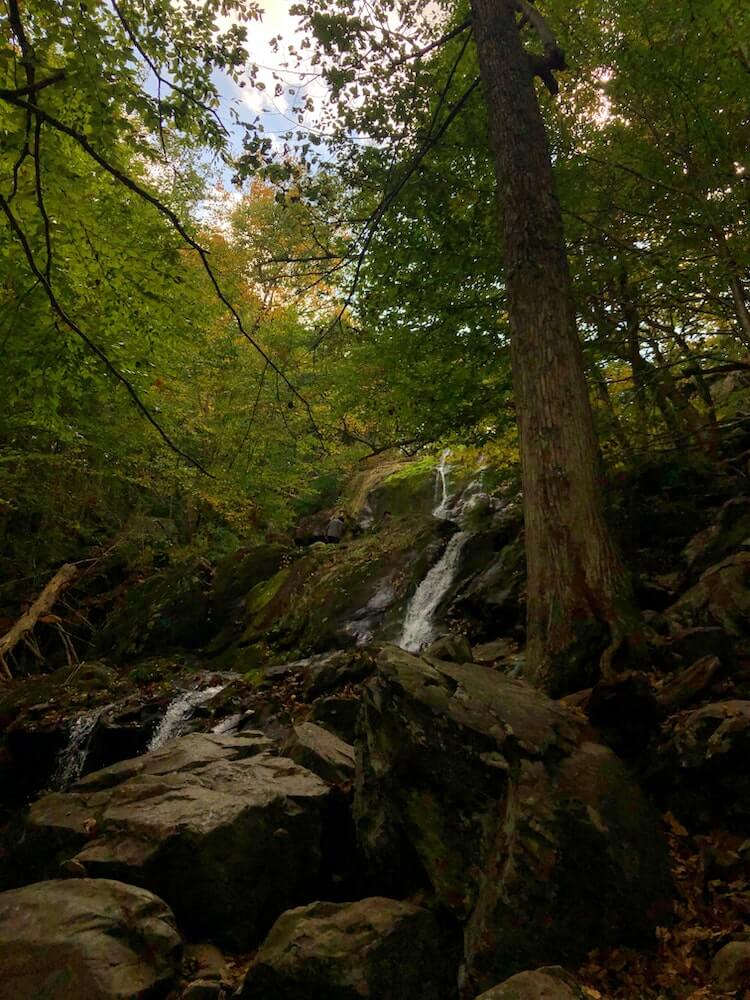
Summer is a lovely time to visit for gorgeous wildflowers all over the place, a few delightful events, and all campgrounds, trails, and roads are pretty much completely open.
Unfortunately, this is a very popular time of year to visit. But you can still find ways to avoid crowds (as I’ll discuss below)!
Weather in the Summer in Shenandoah:
It can also rain a bit during the summer too, especially those lightning storms. However, it rarely rains the entire day in the summer so you can get back out and explore! But overall, things can get hot here, so be prepared.
- June: The average highs in June are around 82ºF (28ºC) and lows are closer to 61ºF (16ºC). There are about 9 days of precipitation during this time.
- July: The average highs in July are around 86ºF (30ºC) and lows are closer to 66ºF (19ºC). There are about 9 days of precipitation during this time.
- August: The average highs in August are around 85ºF (29ºC) and lows are closer to 63ºF (17ºC). There are about 8 days of precipitation during this time.
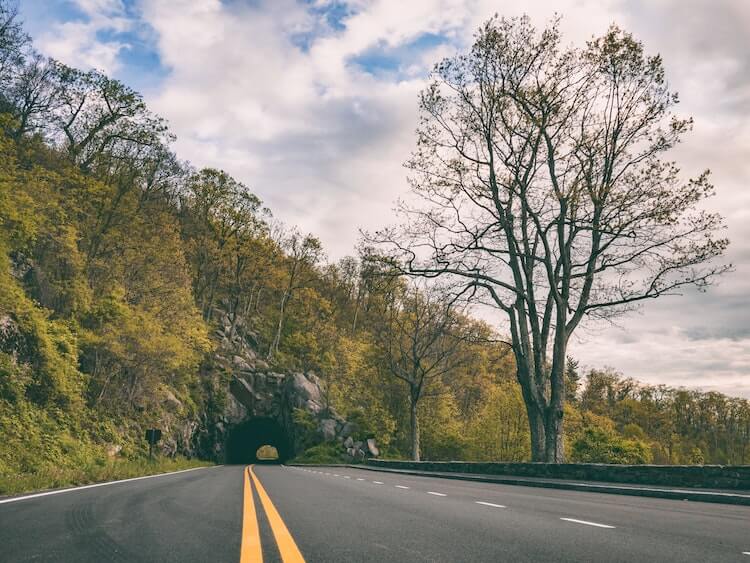
Crowds:
Expect to see quite a few people exploring the park during this time of year. When I say there are more crowds, it isn’t as bad as the Smoky Mountains in the summertime, but yes, you will have more people there at the same time as you.
Popular trails like Old Rag and Stony Man may get quite crowded, and parking lots may be full.
Expect more crowds and traffic along Skyline Drive and on lookouts during this time.
Pros of Visiting Shenandoah in the Summer:
- Beautiful flora and fauna on full display within the park
- Warmer weather with roads, trails, and campgrounds fully open
- Longer days are perfect for taking your time on hiking trails and driving Skyline Drive
- There are incredible events like the Blueberry Delight Festival in July and the Annual Night Sky Festival in August!
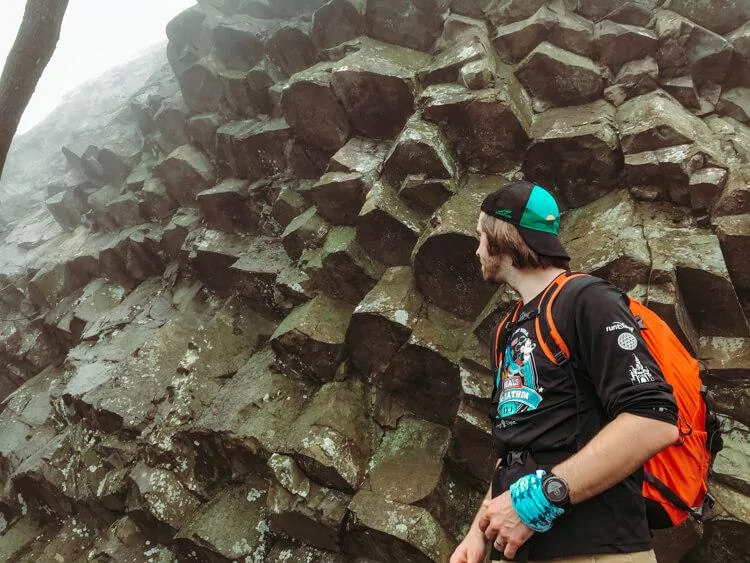
Cons of Visiting Shenandoah in the Summer:
- Crowds. Again, there are ways of avoiding crowds but expect to see more people.
- It does rain a bit, but typically not all day. Packing a rain jacket is helpful, and bring plenty of layers on hikes to keep you warm and dry. Again, there could be fog (there can be fog any time of year thanks to the altitude).
- It is full-on tick season. If you plan to do a lot of hiking be sure to stick to the trail, check yourself for ticks before you get in your car, take a shower and check again, and bring a tick key on the trails to safely remove a tick if you find one attached to you.
- Hot days mean you’ll want to pack plenty of water! We hike with our 3L water bladder in our Osprey Hikelight backpack. We also carry a Lifestraw water bottle. REI also has a great article to help you figure out how much water to carry. It is better to be over-prepared than under-prepared this time of year. Electrolyte tablets are a great thing to bring with you too!
Overall, summer can be a great time to visit if you plan accordingly and don’t mind getting up earlier to beat the heat and crowds. The wildflowers, festivals, and beautiful scenery of the summer make it still a worthwhile time to visit!
Best Time to See Fall Colors in Shenandoah National Park: Autumn
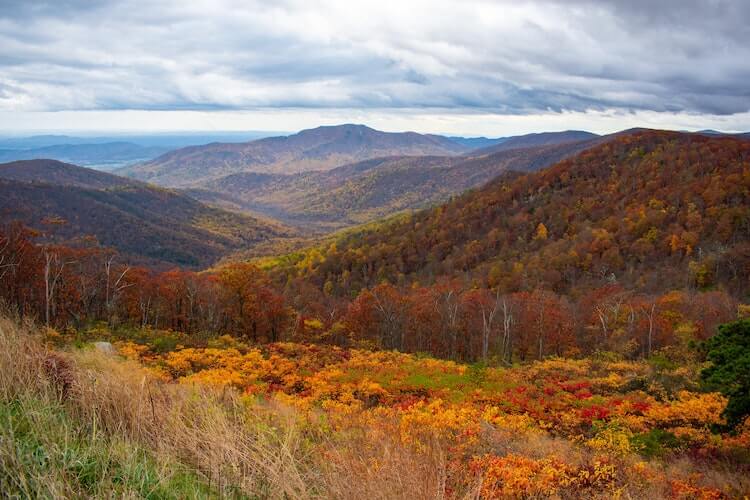
Okay, this sounds obvious, but the best time to see fall colors in Shenandoah National Park is in the fall. More specifically, October is the best time to visit Skyline Drive in the fall.
If you time it right, mid to late October is perfect to hit peak fall foliage in most of the park, while early October you’ll see leaves changing in higher elevations.
The weather is more bearable than in summer, but, because of the gorgeous fall foliage, Skyline Drive is a popular place to be.
Weather in Shenandoah in the Fall:
- September: The average highs in September are around 77ºF (25ºC) and lows are closer to 56ºF (13ºC). There are about 7 days of precipitation during this time.
- October: The average highs in October are around 66ºF (19ºC) and lows are closer to 44ºF (7ºC). There are about 7 days of precipitation during this time.
- November: The average highs in November are around 55ºF (13ºC) and lows are closer to 36ºF (2ºC). There are about 6 days of precipitation during this time.
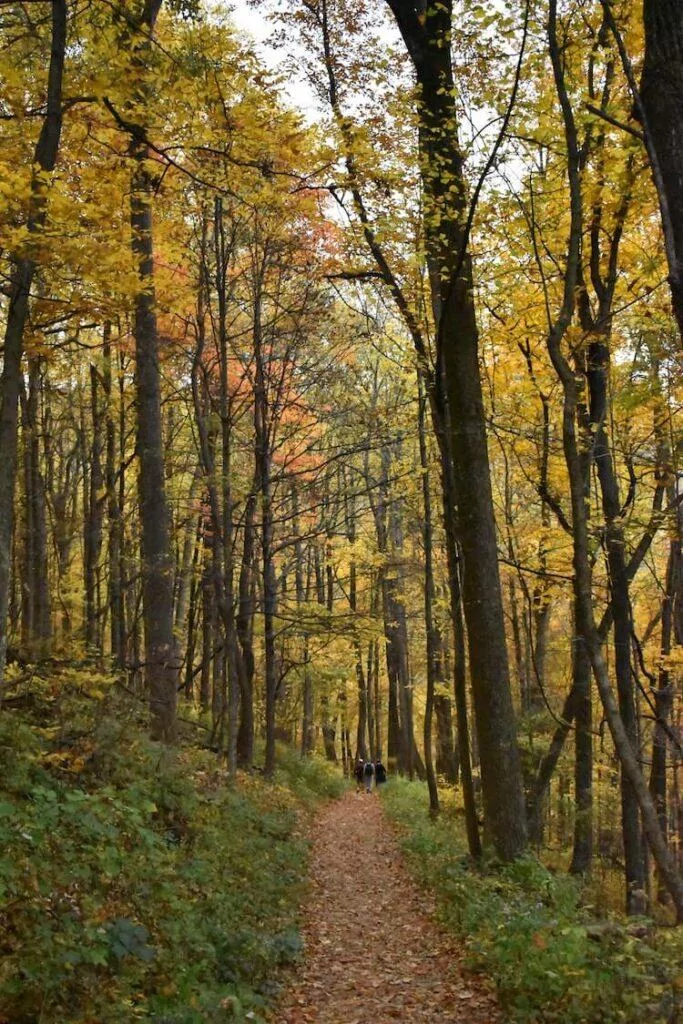
Crowds:
Leaf peepers abound during this time of year, especially in October. Expect to see more traffic along Skyline Drive as well as full overlooks, lodges, and parking lots at popular trails.
However, if you visit in September or November, you’ll see far fewer crowds and it may be the perfect time to visit Shenandoah. With less rain than in the spring, and decent temperatures, those two months are quite comfortable and have fewer crowds!
Pros of visiting Shenandoah National Park in the fall:
- Gorgeous fall foliage throughout the park
- The hot temperatures are cooling down, making days here much more pleasant
- Dryer days make for fun drives and hikes
- Apple Butter Celebration is a great festival in September
- Most roads, trails, and campgrounds are open during this time of year until late fall
- All the surrounding vineyards in Shenandoah Valley are lovely during harvest season!
Cons of visiting Shenandoah in the fall:
- Crowds, especially around October during peak fall foliage
- There are still some bugs, so be careful
- There can be some fog in the mornings, making driving a bit trickier and views not as great
Overall, fall is a fantastic time to visit aside from the crowded month of October. Even then, avoiding the weekends will greatly cut down on crowds! For lovely weather, fall foliage, and fewer crowds in September and November, fall can be a really great time to visit!
When to Visit Shenandoah National Park: Winter
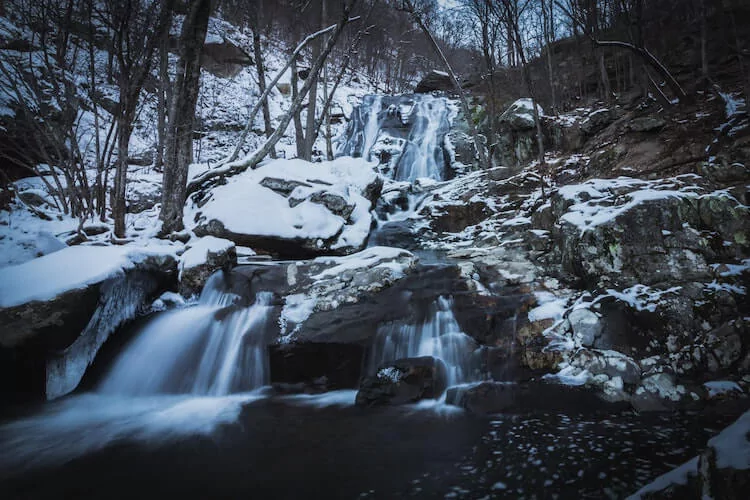
Shenandoah National Park is open year-round, meaning that you can also visit in the winter! While Shenandoah is located in Virginia, a state that has relatively mild winters with little snow, thanks to the elevation here, expect some chilly days and some snow.
However, not many people actually visit this time of year, making it the least busiest time to explore the park! Let’s talk about visiting Shenandoah National Park in the winter.
Weather in Shenandoah National Park in the Winter:
- December: The average highs in December are around 45ºF (7ºC) and lows are closer to 29ºF (-2ºC). There are about 6 days of precipitation during this time.
- January: The average highs in January are around 42ºF (6ºC) and lows are closer to 25ºF (-4ºC). There are about 7 days of precipitation during this time.
- February: The average highs in February are around 44ºF (7ºC) and lows are closer to 26ºF (-3ºC). There are about 7 days of precipitation during this time.
Bear in mind that Shenandoah can get around 19 inches of snowfall a year. This also can affect the roads, meaning some roads and trails could be closed.
January is the coldest month of the year, and, while the average temperatures are listed, it can get below zero at times too. The mountains can also be 10 degrees Fahrenheit colder than the valley below.
Basically, pack a lot of layers, bring crampons for the ice and snow, wear thick waterproof boots and jackets, and bring gloves, hiking poles, and earmuffs.
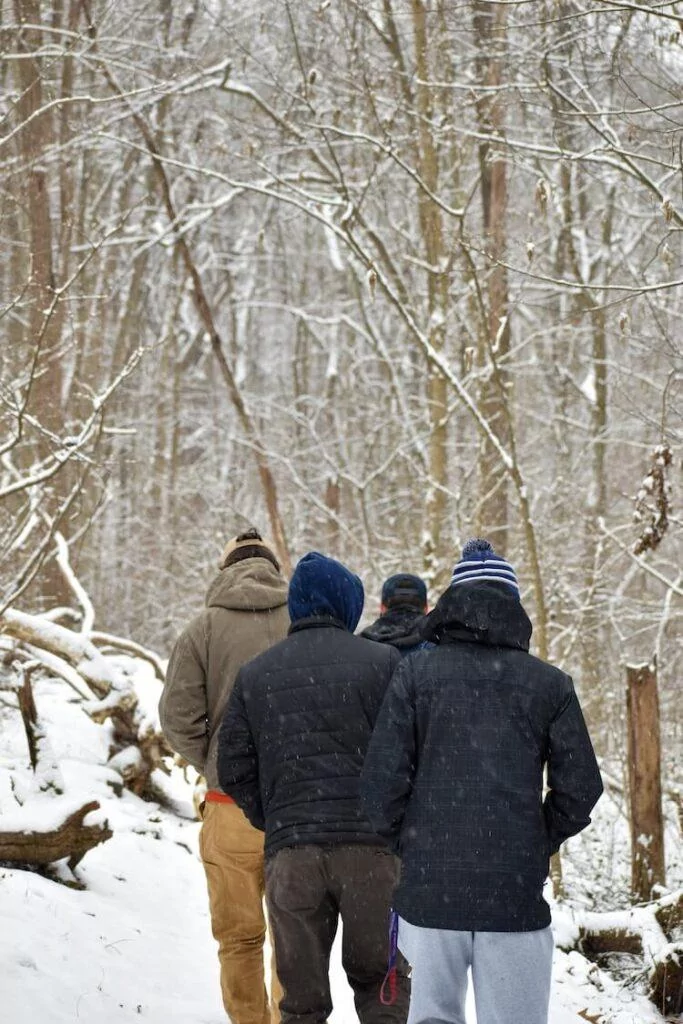
Crowds:
The great thing about visiting Shenandoah National Park in winter is the fact that there are very few crowds. Skyline Drive is empty, and many trails will likely have fewer people on them.
Pros of visiting Shenandoah National Park in the Winter:
- Wildlife spotting! Thanks to less tree cover and maybe some snow, you can see animals like deer, turkeys, squirrels, and birds out and about as well as foxes or bobcats that are active this time of year.
- Far less people. If you want to have trails, overlooks, and Skyline Drive almost to yourself, winter is a fantastic time to visit!
- Less sunshine equals more night sky. Shenandoah National Park has some great spots to see the night sky, notably near Big Meadows area, close to the Rapidan Fire Road. On a clear night you can see the Milky Way and over 2,500 stars!
- No bugs! You are out of tick season, so you don’t really need bug spray for your hikes.
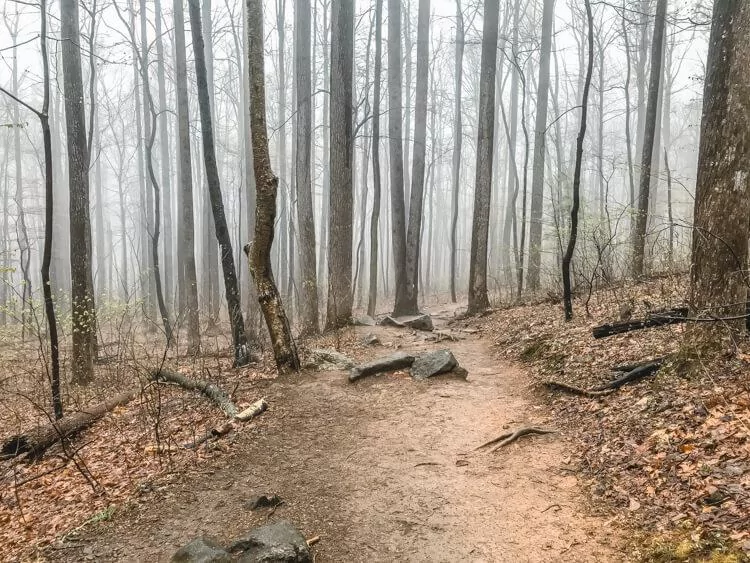
Cons of Visiting Shenandoah National Park in the Winter:
- Cold weather means being super prepared during drives and hikes including bringing blankets and many layers. Again, there could be fog.
- Road and trail closures can happen in bad weather.
- The lodging in the park is closed.
- Less daylight so you’ll need to make sure you finish your hikes earlier.
- Slippery and icy conditions on the trails can be dangerous.
Again, if you are prepared for hiking in the cold or have flexible plans in case of road closures, then winter can be one of the best times to visit Shenandoah National Park. With few people and chances to spot some wildlife, this is a great time to explore the park at your own pace.
Here are some tips for visiting in the winter from the National Park Service.
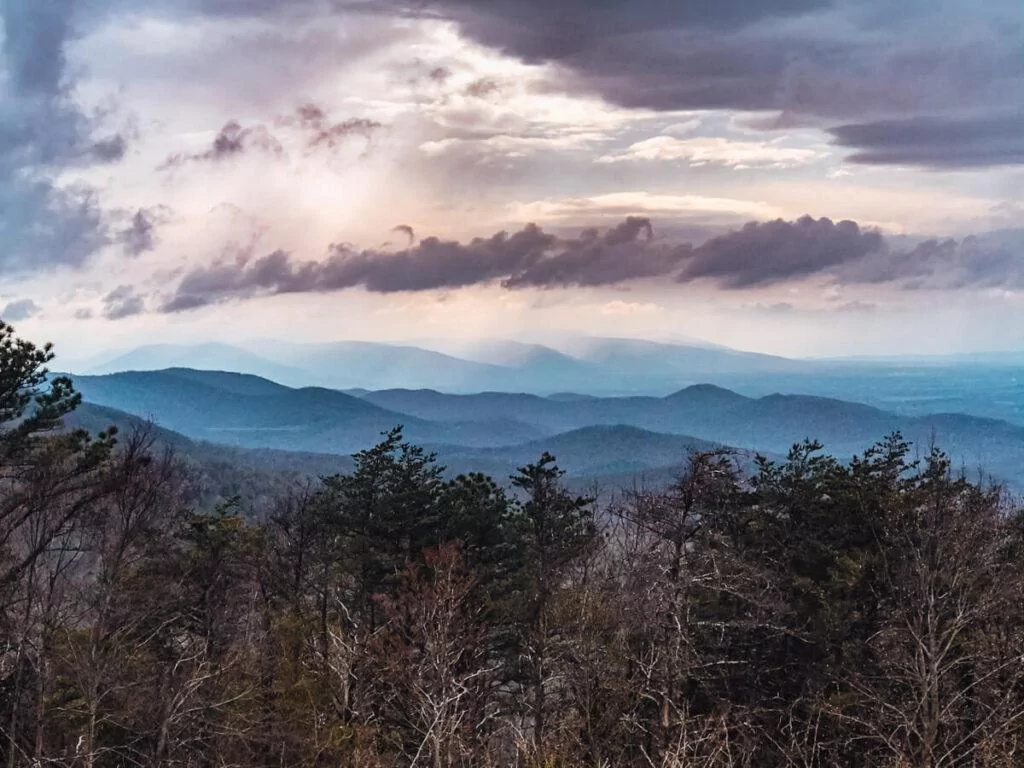
When is the Best Time to Visit Shenandoah National Park?
So when is the best time to visit Shenandoah National Park? Early spring or September are great times to visit Shenandoah.
While the best time to visit is largely up to your goals and preferences, these are great times to have decent weather and have fewer crowds than peak months.
We visited this past April and really enjoyed it! While there was quite a bit of fog in the mornings and we had some rain, it all cleared up by afternoon, leaving us with great views! We also hiked Old Rag on a Friday morning and there were not that many people on the trail at all.
September is also a great time to visit because there aren’t a lot of the summer crowds (especially families with school-aged kids), but it is just before the leaf peepers come into the park.
Both times are great for long drives on Skyline Drive without too much traffic, as well as having decent weather and trails almost to yourself!
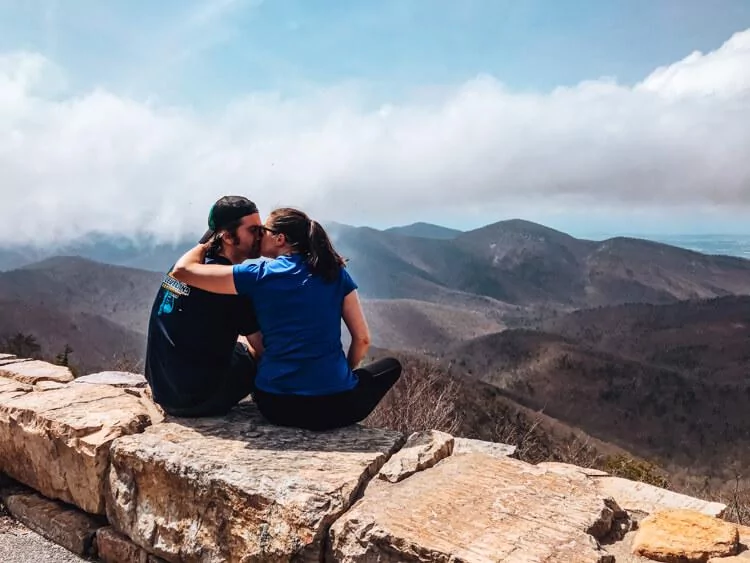
Tips For Avoiding Crowds in Shenandoah National Park
Like I said before, Shenandoah isn’t nearly as crowded as say, the Great Smoky Mountains National Park, so while there are times when parking lots can be crowded and there is quite a bit of traffic along Skyline Drive, there are ways to avoid the crowds.
For starters, getting up early in the morning really helps. Starting a hike at 7 am will almost always ensure that the parking lot isn’t full so you can find plenty of parking. Also starting your drive along Skyline Drive early helps.
If you don’t necessarily want to get up super early, then visiting during the week is great too no matter the time of year.
Regardless, not every trail in the park or even section of the park is always crowded. The Big Meadows area is certainly the most popular with several hiking trails around it. So expect crowds there.
However, we found some hidden gems like the basalt columns off of the Compton Peak Summit via the Appalachian Trail at mile 10.4 at the top of the park and Doyles River Falls at mile 81.1 at the bottom of the park.
The southern end of the park also gets a bit less traffic than the central part.
Yes, you can definitely find hidden gem hikes and overlooks throughout the park that shouldn’t be overcrowded!
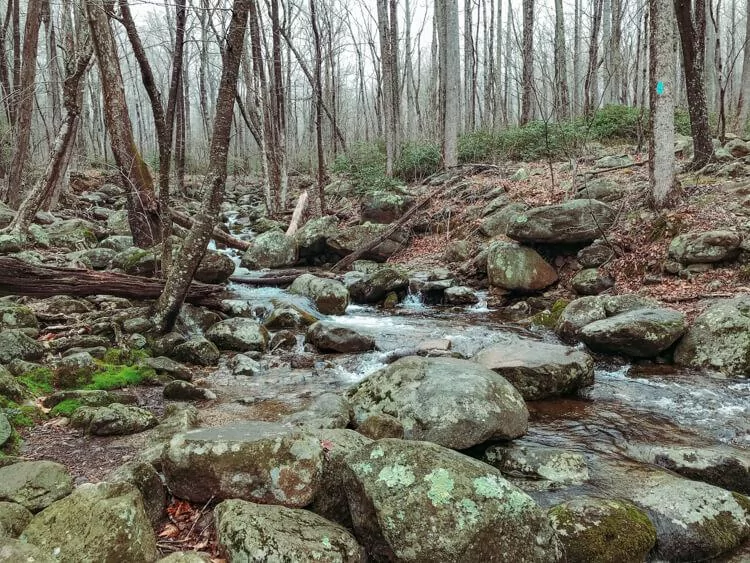
Where to Stay in Shenandoah National Park
There are several options for where to stay in Shenandoah National Park and in the surrounding area. Here are some options below.
Bear in mind that lodging within the park isn’t open during the winter months.
Campgrounds:
- Mathews Arm Campground at mile 22.1
- Big Meadows Campground at mile 51.2
- Lewis Mountain Campground at mile 57.5
- Loft Mountain Campground at mile 79.5
- Dundo Group Campground at mile 83.7 (for group camping only)
Prices start at $15 per night, and there isn’t electricity. However, there are toilets. Book in advance especially on weekends.
Lodges:
- Skyland has rooms and cabins and is located at mile 41.7. Prices start around $150 per night. Book it here!
- Big Meadows Lodge is at mile 51 and has rooms, suites, and cabins. They also offer pet-friendly rooms. Prices start at $150. Book it here!
- Lewis Mountain Cabins are at mile 57.5 and are rustic cabins with their own bathrooms and outdoor grill areas. Prices start at $145 per night. Book it here!
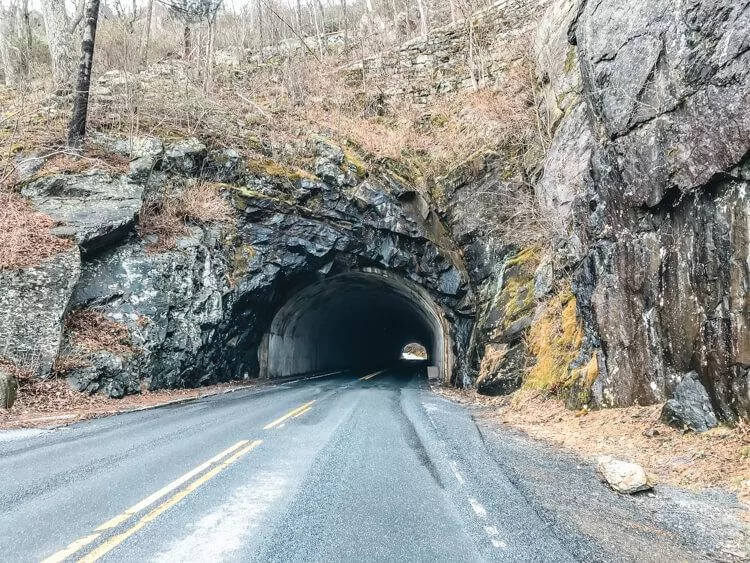
Hotels Near Shenandoah National Park:
Budget: Lafayette Inn And Restaurant
This is located at the southern end of the park and close to the Swift Run Gap entrance. Prices start at $100 per night. This is a charming and historic inn!
Mid-Range: The Mimslyn Inn
This is located in Luray and near the Thornton Gap entrance of the park. Prices start around $135 per night. Enjoy this sprawling Georgian Revival Inn!
Luxury: Hopkins Ordinary Bed & Breakfast
This is also located near the Thornton Gap entrance and prices start around $350 per night. Enjoy quaint, luxurious rooms!
There is also the option to book VRBOs nearby too. We loved the town of Culpepper near the middle part of the park and closer to the start of the Old Rag hike. Check out great rental options here!
When it comes to visiting Shenandoah National Park, there isn’t really a bad time to visit! Whether you are in search of gorgeous traffic-free drives along Skyline Drive, stunning fall foliage, or dazzling wildflowers and wildlife, there is always something to see in Shenandoah!
When would you most like to visit Shenandoah National Park?
Want more national park content? Check out our guide to Glacier National Park!
Pin it here!

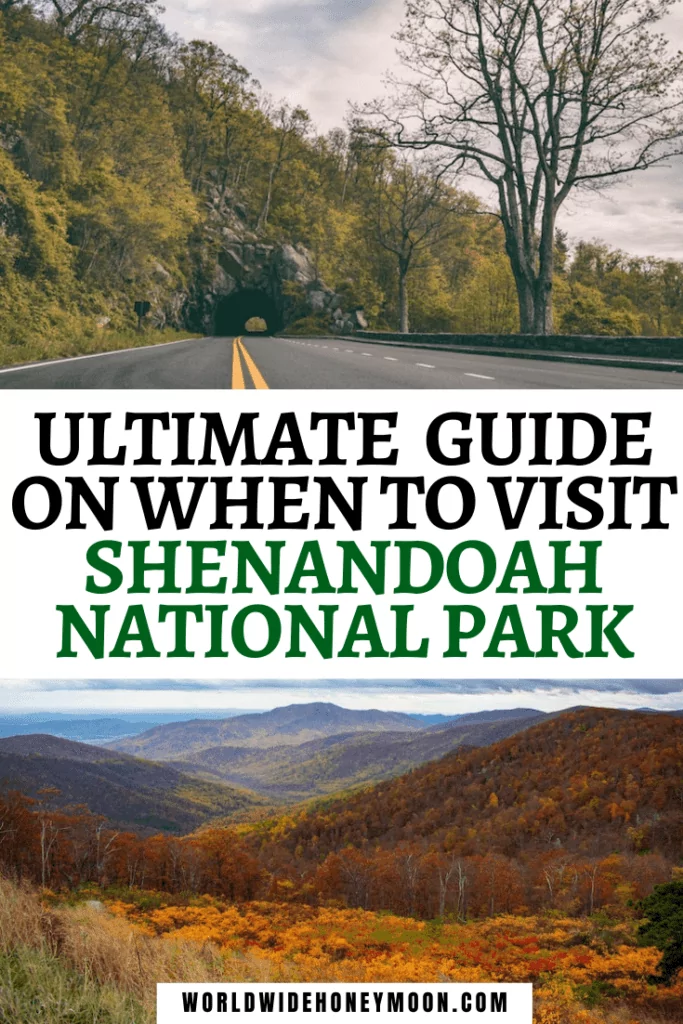
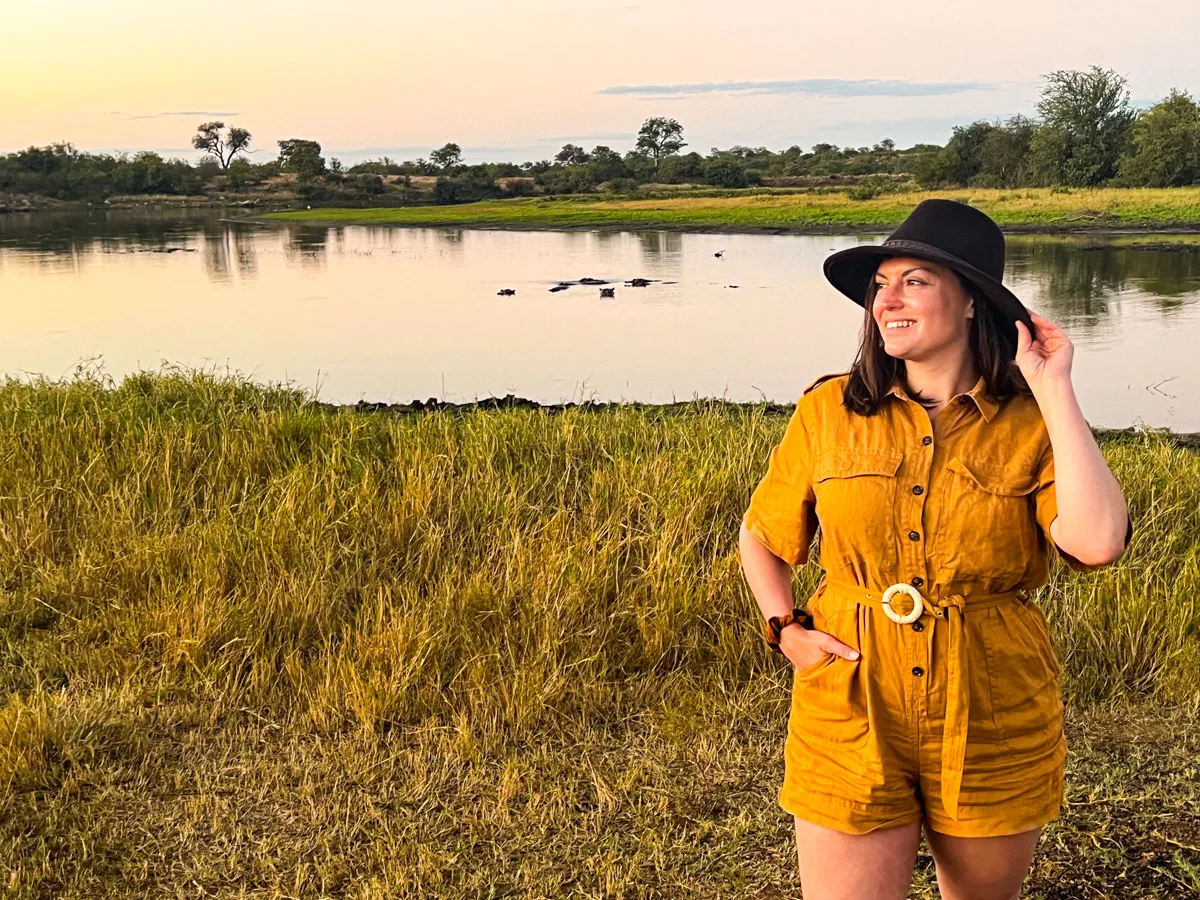
Kat is the founder and author of the World Wide Honeymoon blog. She has traveled to 43 countries spanning 5 continents to find the most romantic, unique, and fun places for couples to enjoy time together. She creates in-depth itineraries, honeymoon guides, packing lists, and even travel budget guides (Kat’s a former accountant!). Kat has been blogging since 2017, giving honest opinions and tips from her experiences while traveling. Aside from this blog, she runs a podcast with her husband, Chris, called the World Wide Honeymoon Travel Podcast and a travel blog dedicated to France called France Voyager.
